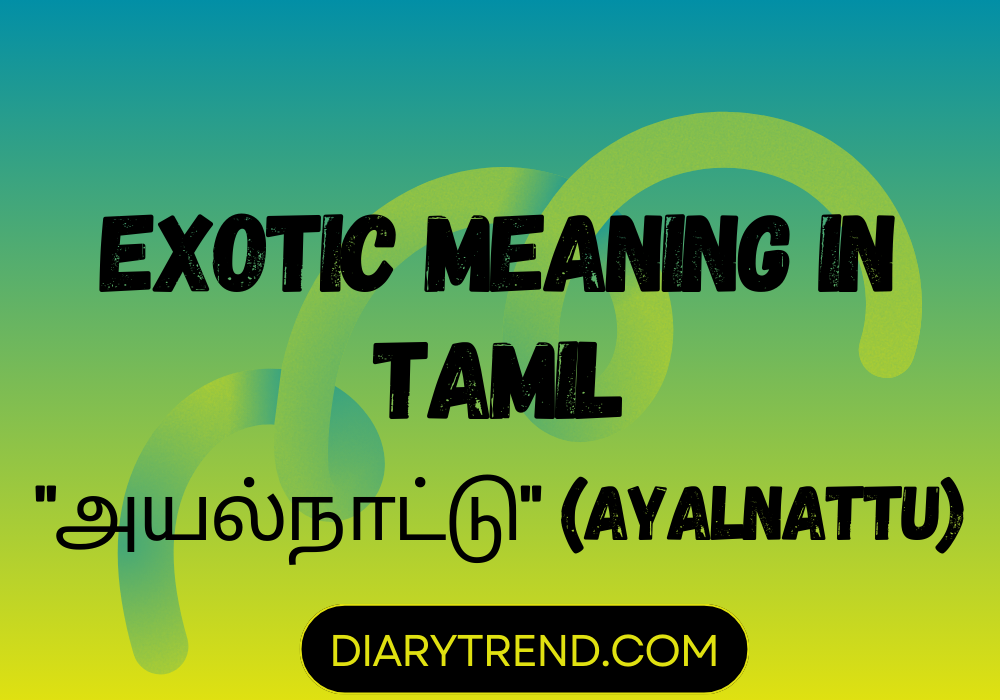The term “exotic” in English, when translated to Tamil, becomes “அயல்நாட்டு” (Ayalnattu), which directly pertains to something foreign or originating from another country. The word itself carries a breadth of connotations and implications, both in English and Tamil, navigating through cultural, ecological, and even personal dimensions. This article explores the multifaceted nature of the term “exotic,” particularly in the context of its Tamil translation, its applications, cultural implications, and the nuanced connotations it may carry in different contexts.
Origins and Etymology
The English term “exotic” is derived from the Greek word “exotikos,” which means “from the outside” or “foreign.” This etymology is directly mirrored in the Tamil translation “அயல்நாட்டு,” where “அயல்” means foreign or external, and “நாட்டு” refers to country or land. The linguistic journey of this term from ancient Greek to contemporary Tamil underscores the universal human curiosity towards the unfamiliar and the foreign.
Cultural Implications
In Tamil culture, the concept of “அயல்நாட்டு” often conjures images of distant lands, unfamiliar customs, and novel experiences. This perception is deeply intertwined with the human inclination towards exploration and understanding of the unknown. Historically, Tamil society has been part of extensive trade networks, interacting with diverse cultures and bringing back exotic goods and ideas to the Indian subcontinent. Such interactions have not only enriched Tamil culture but also fostered a sense of wonder and appreciation for the diversity of the world.
Ecological Concerns
The term “exotic” also finds significant relevance in ecological discussions, where “அயல்நாட்டு” species refer to flora and fauna that are not native to a particular ecosystem. While the introduction of such species can sometimes lead to positive outcomes, more often than not, it poses severe threats to local biodiversity. The Tamil-speaking regions, rich in ecological diversity, have witnessed firsthand the challenges posed by invasive exotic species, making the term carry a cautionary note within environmental dialogues.
Personal and Social Dimensions
On a personal level, the allure of the exotic can be seen in the Tamil fascination with foreign lands, cuisines, and traditions. This fascination often reflects a desire for novelty and the enriching experience of cross-cultural exchange. However, it’s crucial to navigate these interests with sensitivity towards cultural appropriation and the potential exoticization of cultures, which can lead to oversimplification or misrepresentation of the complexities inherent in them.
Economic and Trade Perspectives
In the context of trade and economics, “அயல்நாட்டு” goods hold a significant place in Tamil markets, symbolizing luxury, rarity, and desirability. This not only includes tangible products but also intangible services and experiences deemed exotic. The economic implications of such trade are vast, affecting local industries, employment, and even cultural perceptions of value and quality.
Conclusion
The term “exotic,” or “அயல்நாட்டு” in Tamil, encapsulates a complex web of meanings and implications that span cultural, ecological, economic, and personal dimensions. Its usage reflects both the universal human curiosity towards the unfamiliar and the specific cultural contexts that shape this curiosity. As we navigate through an increasingly globalized world, understanding and reflecting on the nuances of such terms become crucial in fostering a more inclusive and empathetic global community. By exploring the depths of “அயல்நாட்டு,” we not only deepen our understanding of the Tamil language and culture but also engage in a broader conversation about diversity, connectivity, and the human experience at large.
